China is rapidly evolving into the world’s most digitised economy, making digital marketing essential for any company aiming to succeed there. Crafting a comprehensive strategy requires a deep understanding of China’s complex online and social media landscape, as well as the purchasing behaviours of Chinese consumers across various platforms.
There are numerous ways to leverage digital and social media to establish a strong presence and grow your business in China. Western companies are exploring diverse approaches to meet their unique needs.
A holistic approach to B2B digital marketing in China starts with the basics, examining the landscape, trends, and best practices for utilizing popular local social media channels to craft effective strategies.
This article delves into the rapidly evolving digital marketing landscape for B2B in China and offers insights into how companies can navigate this complex ecosystem effectively.
The Chinese Digital Ecosystem: A Unique Landscape
In China, Western social media platforms like Facebook, YouTube, and Twitter are restricted, leading to the rise of local giants such as WeChat, Weibo, Douyin (China’s version of TikTok), and Little Red Book. The digital ecosystem is unique, yet it features apps that correspond to global counterparts.
As of June 2024, approximately 78% of the Chinese population had used the internet. Among these users, a staggering 99% prefer accessing the internet via mobile devices rather than computers. Mobile phone penetration is remarkably high, with over 1.7 billion mobile subscriptions recorded, according to Statista.
This underscores the deep integration of mobile devices into daily life in China, where people rely heavily on their phones for communication, entertainment, and business. A typical Chinese internet user engages with various apps throughout the day, from the moment they wake up until they go to bed, maintaining accounts on at least eight different platforms, including WeChat, Weibo, Toutiao, and Zhihu.
With this large base of internet users, digital marketing has seen significant growth in recent years across both B2B and B2C sectors. For companies, especially foreign businesses entering the Chinese market, digital marketing is no longer an option—it’s a necessity.
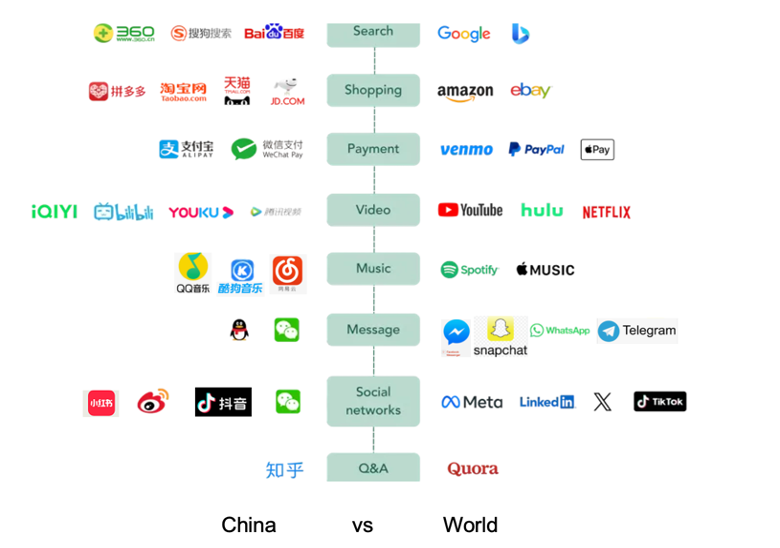
source: based onMGWW
Let’s take a look at the unique landscape of the Chinese digital ecosystem.
Currently, Tencent, Alibaba, Baidu and ByteDance are the leading digital platforms and are very strong, yet separate ecosystems. It is called “BAT” + “B”. Under each digital marketing giant, various products/apps are developed and used, including social ones, maps, video, lifestyle, music, travel, payment etc, which makes people engage in various needs online.
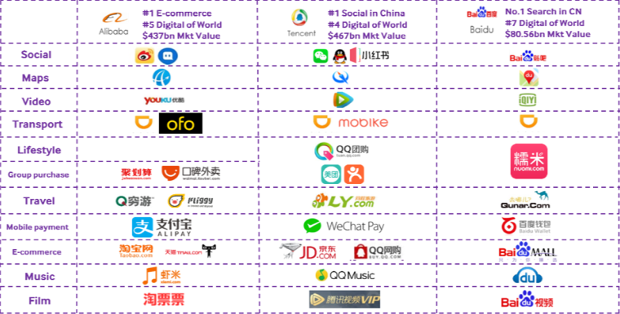
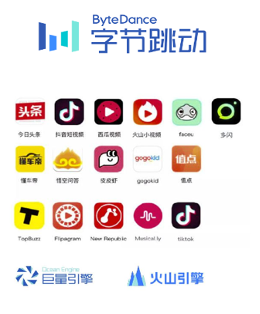
For B2B companies, understanding and leveraging these platforms is crucial for success. Here’s an introduction to key platforms and their potential in B2B digital marketing:
WeChat: A Must-have for B2B Engagement
WeChat is a core product of Tencent, a leading company in digital marketing. Tencent offers a variety of popular products and services, including WeChat, Xiaohongshu, Tencent Video, and numerous games. Today, WeChat is one of the most popular apps, widely used by Chinese people both within China and abroad.
WeChat is a multi-purpose app that combines messaging, social media, payments, e-commerce, and other services, allowing users to perform various tasks without leaving the app. Often described as China’s “app for everything” and a “super app,” WeChat offers a wide range of functions, including messaging (text, voice, video), social media sharing (Moments), and digital payments (WeChat Pay). It also features advanced capabilities like Mini Programs for e-commerce and services, official accounts for business engagement, public services (e.g., utility bill payments), and WeChat Work for office collaboration.
Additionally, WeChat supports in-app gaming, QR code payments, ride-hailing, e-commerce, food delivery, live streaming, and even low-cost global calls through WeChat Out.
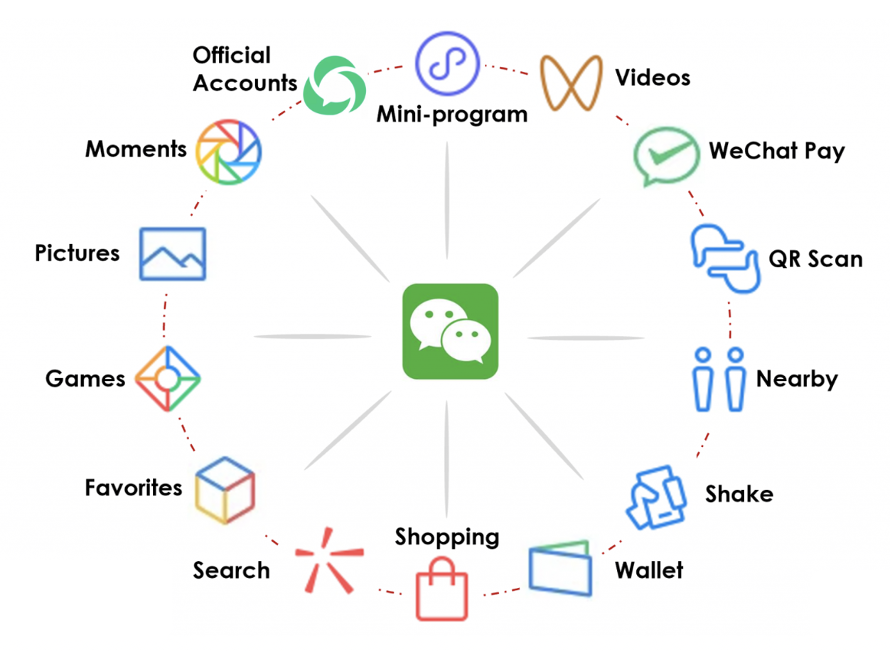
The number of active WeChat accounts has been rapidly and steadily increasing. In 2023, WeChat boasted over 1.3 billion monthly active users. More than 120 million users post updates on Moments daily, and over 614 million use Mini Programs each day. Chinese users spend one-third of their smartphone time on WeChat. The app is popular across the country, spanning all demographic groups.
For B2B businesses, WeChat is an essential tool for customer engagement, lead generation, and relationship management. The platform’s Mini Programs and Official Accounts offer businesses opportunities to create tailored content and interactions within WeChat’s ecosystem.
Moreover, WeChat Work provides B2B companies with an integrated space for professional communication, enabling seamless collaboration with clients, partners, and colleagues. The platform’s extensive reach across all tiers of Chinese cities makes it indispensable for companies aiming to target a diverse range of customers.
Weibo: Enhancing Brand Visibility and Social Advertising
Weibo and Alibaba maintain a strategic business relationship, with Alibaba leveraging Weibo for social advertising, brand promotions, and driving traffic to its marketplaces like Taobao and Tmall.
Often dubbed the Chinese version of X (formerly Twitter), Weibo boasts 586 million monthly active users, with around 260 million accounts engaged daily. The platform allows users to post short messages, images, and videos, and share trending topics through hashtags. It is particularly popular in Tier 1 and Tier 2 cities, attracting a large following of key opinion leaders (KOLs) and celebrities who use trending topics and hashtags to boost visibility.
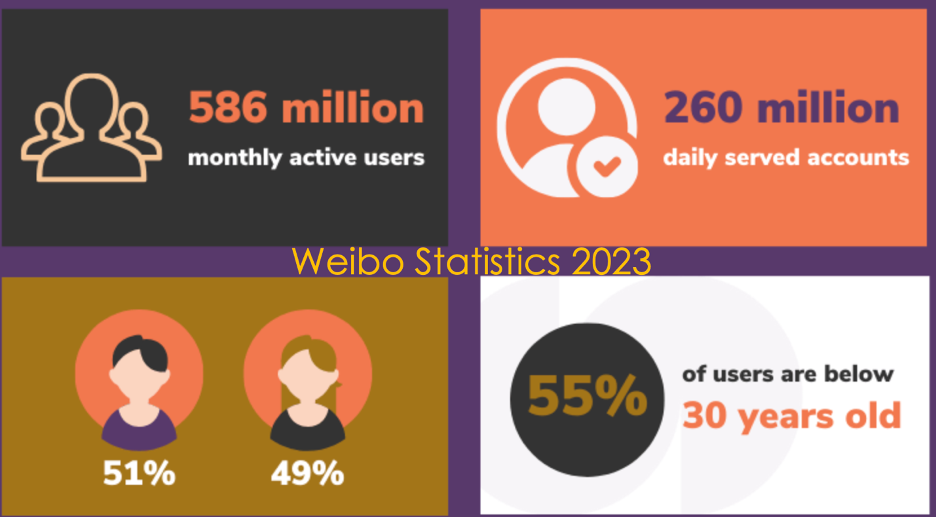
source: SDG
For B2B companies, Weibo offers significant potential through social advertising and influencer marketing. Businesses can leverage Weibo to reach industry-specific audiences, build brand awareness, and foster conversations around their products and services. However, while Weibo is a powerful platform, it often requires substantial resources, making it challenging for small and medium enterprises (SMEs) to manage without an appropriate budget.
Toutiao: Content-Driven Marketing for Targeted Reach
Toutiao is a widely-used news and content platform in China, with around 300 million monthly active users as of February 2024. It employs an advanced AI algorithm to deliver highly personalized content recommendations based on user’s interests and behaviours, ensuring targeted reach for advertisers and content creators. As a content-driven platform, Toutiao is ideal for press releases, product announcements, and content marketing, making it a powerful tool for businesses aiming to engage with Chinese audiences through curated and relevant information.
Douyin (TikTok): Short Video for Brand Awareness
Launched in September 2016 by ByteDance, Douyin (Chinese TikTok) has emerged as a leader in China’s short-video platform market. With 743 million monthly active users, it boasts a diverse demographic—54% male and 46% female—with a significant concentration of users aged 16-24. Notably, Douyin has seen increased adoption among older users, expanding its audience reach.
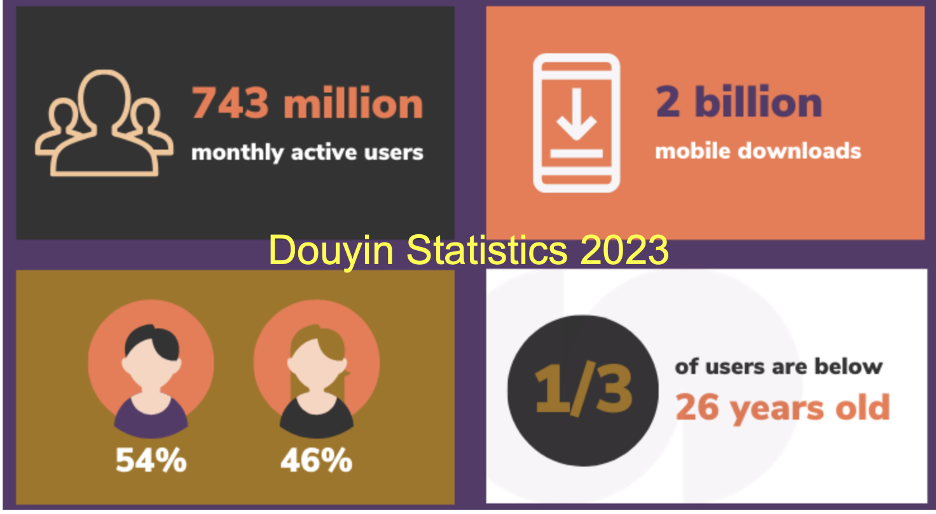
source: SDG
The platform integrates live streaming and robust e-commerce tools, enhancing user engagement and creating opportunities for content creators and brands alike. Douyin’s growth is further underscored by its remarkable 2 billion mobile downloads, establishing it as a dominant force among social media platforms. While it primarily attracts a younger audience, its evolving user base indicates a trend towards broader demographic inclusion.
Traditionally seen as a B2C platform, Douyin’s popularity and growing user base make it an excellent tool for B2B companies looking to build brand awareness. The platform’s integration of live streaming and e-commerce allows companies to showcase products, host webinars, and provide behind-the-scenes content through engaging videos.
Xiaohongshu (Little Red Book): Leveraging Key Opinion Leaders for Product Discovery
Xiaohongshu, also known as “Little Red Book,” is often referred to as the Chinese equivalent of Instagram. Since its launch in 2013, it has quickly become a crucial social media platform for younger Chinese consumers, particularly women. The platform fosters a community-driven environment focused on user-generated content related to fashion, beauty, travel, and lifestyle.
As of the first quarter of 2024, Xiaohongshu boasts 300 million monthly active users, a significant increase from 100 million in 2021, according to Qingua reports. The user base primarily consists of individuals in their early 20s to late 30s, with 39% aged 18-24 and 38% between 25-34. This dynamic demographic showcases a vibrant community that thrives on sharing personal experiences, recommendations, and tips about various products.
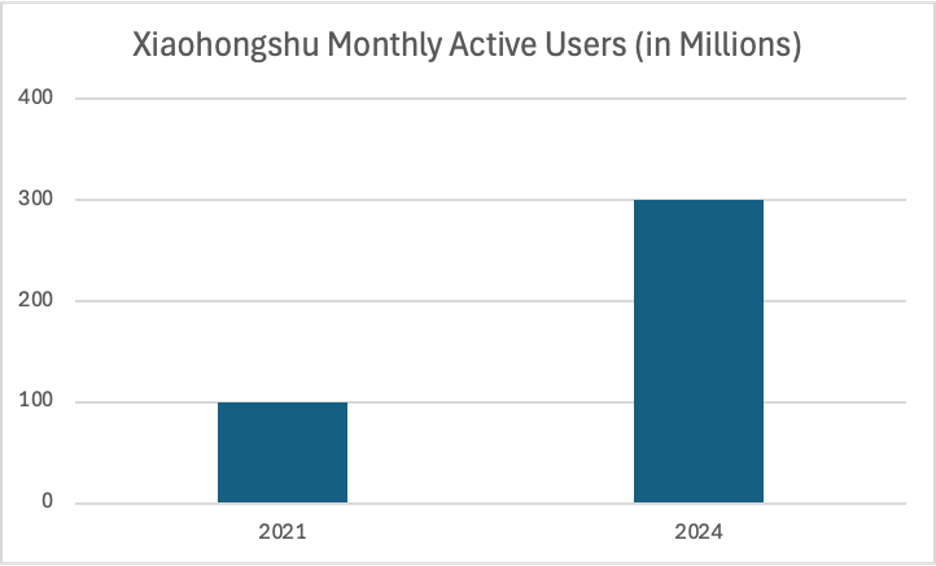
Key opinion leaders (KOLs) on Xiaohongshu are considered more reliable than those on other platforms, enhancing the app’s reputation as a vital space for product discovery and e-commerce. Users engage with authentic reviews and insights, making Xiaohongshu a go-to source for recommendations in beauty, fashion, and shopping. The blend of social interaction and online shopping has cemented Xiaohongshu’s status as an essential tool for both brands and consumers in the evolving landscape of social commerce.
While primarily a B2C platform, B2B companies in industries such as beauty, fashion, and lifestyle can also leverage Xiaohongshu to connect with influencers and professionals who make purchasing decisions. The platform’s focus on authentic content and peer reviews makes it ideal for companies that rely on word-of-mouth marketing.
Zhihu: A Hub for Credible Information and Expertise
Often referred to as the Chinese version of Quora, Zhihu is a leading question-and-answer platform renowned for its high credibility and authority in search engine results. With over 400 million registered users, Zhihu has become a trusted source of information and expertise across a wide range of topics.
Zhihu’s user base is distinguished by its high educational and economic status, with most users holding a bachelor’s degree or higher and enjoying high incomes. As of 2023, Zhihu had over 102 million monthly active users, including 14.9 million subscribing members, underscoring its appeal to those seeking premium, in-depth content and professional insights.
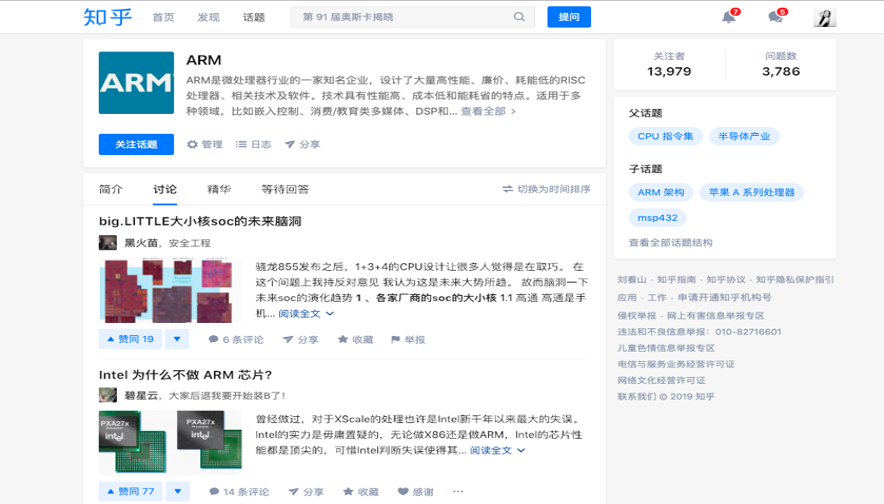
Zhihu is more than just a forum for casual inquiries; it is a place where experts and knowledgeable individuals contribute to discussions, making it a vital resource for users seeking reliable, well-informed answers across various subjects. This has reinforced its position as a high-authority platform in the Chinese internet ecosystem.
For B2B companies, Zhihu offers potential for thought leadership, product discussions, and engagement with industry professionals, helping to build credibility and trust.
Baidu: Search and SEO for B2B
Baidu is China’s largest and most popular search engine, commanding over 80% of the country’s search market. Founded in 2000, Baidu operates exclusively in Simplified Chinese and is tailored to the Chinese internet audience. Beyond search, Baidu offers a variety of services, including maps, cloud storage, AI-powered tools, and online advertising. It is renowned for its image-heavy search results, dynamic rich snippets, and seamless integration with Chinese content.
Baidu’s properties can dominate up to 70% of a search results page. Its rich snippets are notably more dynamic and interactive than Google’s, often featuring tall formats, numerous links, or even interactive JavaScript apps directly on the SERP. While many of these snippets originate from Baidu’s own properties, some can be accessed through the Baidu Open platform, and others are available via paid promotional deals for select partner sites. This extensive use of rich snippets poses a significant challenge for SEO in China.
For B2B companies, optimizing for Baidu SEO is crucial to ensure visibility in search results. The platform’s dynamic rich snippets and integration with other Baidu services offer opportunities for both paid advertising and organic search success. Baidu also plays a critical role in localization strategies, as its search results are specifically tailored to the preferences of Chinese internet users.
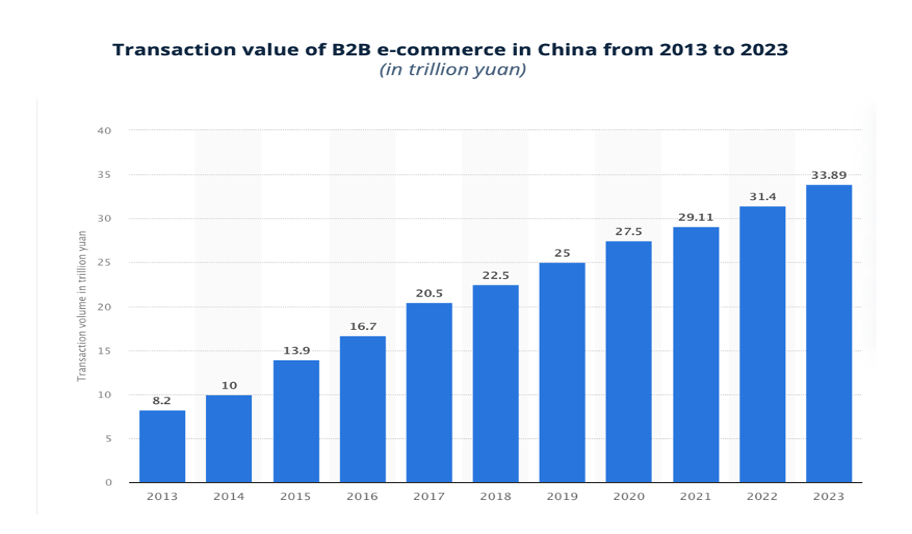
source: Statista
The Future of B2B Digital Marketing in China
As B2B e-commerce continues to expand, reaching 33.89 trillion yuan in transaction volume in 2023, Chinese businesses increasingly expect B2B platforms to offer the same convenience and user experience as B2C platforms. With China’s B2B market projected to grow at a compound annual growth rate (CAGR) of 16.3% from 2024 to 2030, digital marketing will become even more crucial for B2B companies aiming to succeed in the region.
Multinational companies (MNCs) operating in China have already begun prioritizing digital marketing on platforms like WeChat to streamline business operations and engage with potential buyers. A survey by Kawo of 50 international B2B MNCs across 20 industries reveals a growing reliance on social media as a key marketing channel in 2023.
This shift is driven by the relatively lower cost and stability of social media platforms for business operations. Among these platforms, WeChat stands out as the most popular choice. All surveyed companies have official WeChat accounts, and 76% have opened WeChat video accounts, although short video accounts for overseas official accounts are not currently allowed.
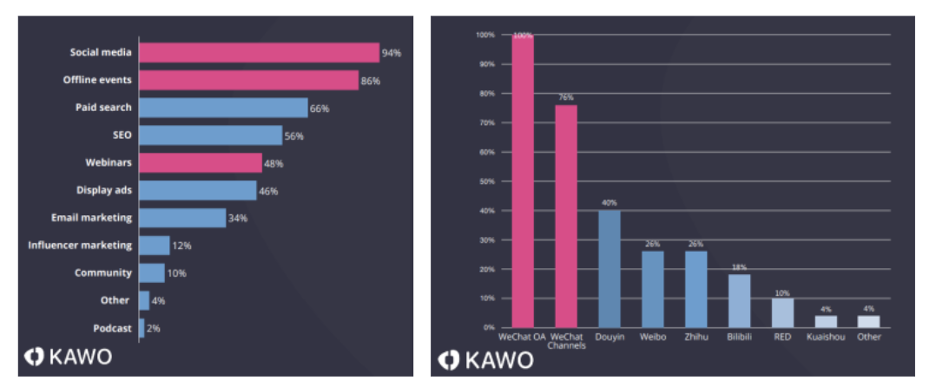
More than 80% of the surveyed MNCs stated that WeChat would be their most important social media platform over the next three years, underscoring its central role in B2B marketing strategies in China. This trend highlights the growing importance of digital engagement for international companies aiming to strengthen their presence in the Chinese market.
B2B Marketing in China: Winning Strategies and Success Stories
For B2B companies aiming to reach this immense market, traditional “boots-on-the-ground” marketing won’t suffice. A localised digital marketing strategy is now essential. And China’s complex online landscape and unique customer behaviors necessitate a tailored approach. At Crayfish.io, we specialize in helping businesses navigate this unique ecosystem to build a localised digital fortress.
We begin by comprehensively analyzing your global and APAC market strategies. Based on extensive research, we create a customized digital marketing plan just for China. This plan encompasses localized branding, communication, content, and channel strategies, along with a detailed implementation roadmap.
Here are some client success stories:
- A British Industrial Product Company: This gas detection sensor manufacturer sought a comprehensive digital strategy to support their Chinese expansion. We localized their content and channels, redesigning their website for better search engine performance. We also crafted a robust PR plan, culminating in a substantial rise in both sales and brand awareness.
- A British Scientific Publishing Organisation: This non-profit desired to engage with the growing number of Chinese researchers. Having no prior presence in China, they faced cultural and social media challenges. Our guidance led them to focus on WeChat, China’s dominant social media platform. We facilitated their account setup, provided ongoing management, and translated scientific materials. Within a year, they built a strong, engaged audience.
- A Belgian Magnetic Solutions Company: This company, experiencing rapid growth in China through resellers, sought to launch a digital marketing campaign. We provided a comprehensive package, including WeChat setup and training, website localization and hosting, SEO services, and content translation. Their success prompted them to further extend their partnership with us.
Conclusion
China’s digital landscape is unparalleled in its complexity and scale. For B2B companies, developing a localised digital marketing strategy that leverages key platforms such as WeChat, Baidu, and Weibo is crucial for success. By integrating content marketing, social media engagement, and search optimization into their strategies, B2B companies can tap into China’s growing e-commerce market and establish a strong presence in the world’s largest digital economy.
China’s B2B market presents tremendous growth opportunities for international companies. With the right digital marketing strategy, companies can successfully engage with their target audiences and achieve sustainable growth.
Don’t navigate China’s digital labyrinth alone. Crayfish.io acts as your compass in this dynamic landscape. By partnering with Crayfish.io, you gain access to our deep understanding of the Chinese B2B landscape. We’ll help you develop and implement a strategy that leverages the power of WeChat, Baidu, Weibo, and other key platforms.
If you’re looking to expand your presence in China, we’re here to guide you every step of the way.
